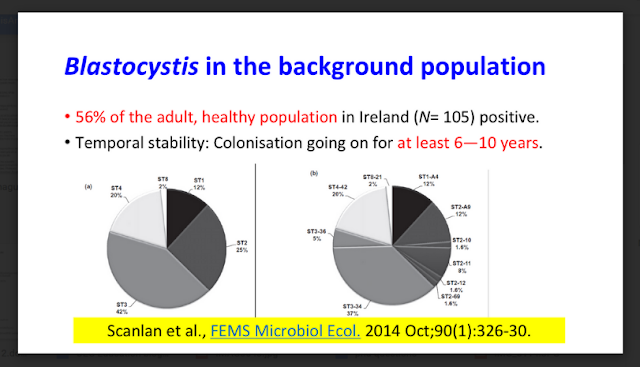- Messages
- 4
A few years ago in a GI Effects GI Test, I came up positive for Blastocystis Hominis aka Blasto. I also had off the charts Candida Albicans overgrowth. At that point, I had frequent sore throats, needed lots of sleep, a little on edge, but no horrible symptoms. I cut all added sugar, caffeine, alcohol, and most gluten and took supplements including:
Herbals: Black Walnut shells, garlic, Berberine, Oregano Oil, Caprylic Acid, Cat's claw extract, Gymnema Silvestre, Biocidin.
Colloidal Silver in Aloe juice
GI Revive for leaky gut.
Anti-biotic: Nitazoxinide.
Probiotics: Saccharomyces boulardii and 4 others.
Treatments: About 10 Fecal Transplants from a confirmed healthy donor (seriously)
And other stuff.
I know many people on here have very harsh symptoms, so from that standpoint, I am fortune. I have almost no symptoms. (Although I am on a moderate HRT regiment--daily transdermal testosterone cypionate to get me into the "normal" range which helps libido, mood, and physique)
My question is this: now I have even fewer symptoms, but my GI test still comes back with low levels of Blasto. Should I continue my marathon of treatments, do another painful anti-biotic regiment? Or just figure I have it in check and run with it.
I realize there may not be a right answer, but there seem to be some sharp informed folks on this forum, so I'd love your opinions. Thank you in advance.
Herbals: Black Walnut shells, garlic, Berberine, Oregano Oil, Caprylic Acid, Cat's claw extract, Gymnema Silvestre, Biocidin.
Colloidal Silver in Aloe juice
GI Revive for leaky gut.
Anti-biotic: Nitazoxinide.
Probiotics: Saccharomyces boulardii and 4 others.
Treatments: About 10 Fecal Transplants from a confirmed healthy donor (seriously)
And other stuff.
I know many people on here have very harsh symptoms, so from that standpoint, I am fortune. I have almost no symptoms. (Although I am on a moderate HRT regiment--daily transdermal testosterone cypionate to get me into the "normal" range which helps libido, mood, and physique)
My question is this: now I have even fewer symptoms, but my GI test still comes back with low levels of Blasto. Should I continue my marathon of treatments, do another painful anti-biotic regiment? Or just figure I have it in check and run with it.
I realize there may not be a right answer, but there seem to be some sharp informed folks on this forum, so I'd love your opinions. Thank you in advance.

